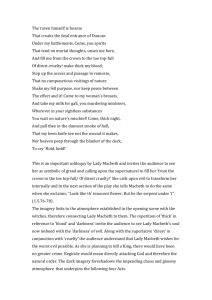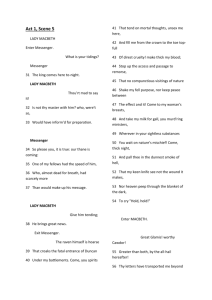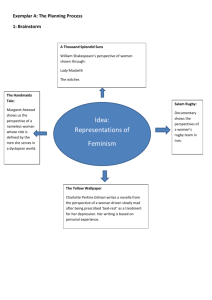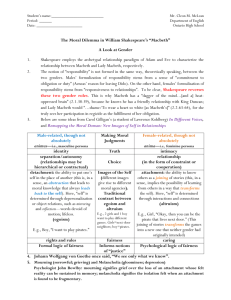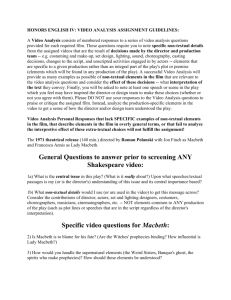Literary Analysis
advertisement
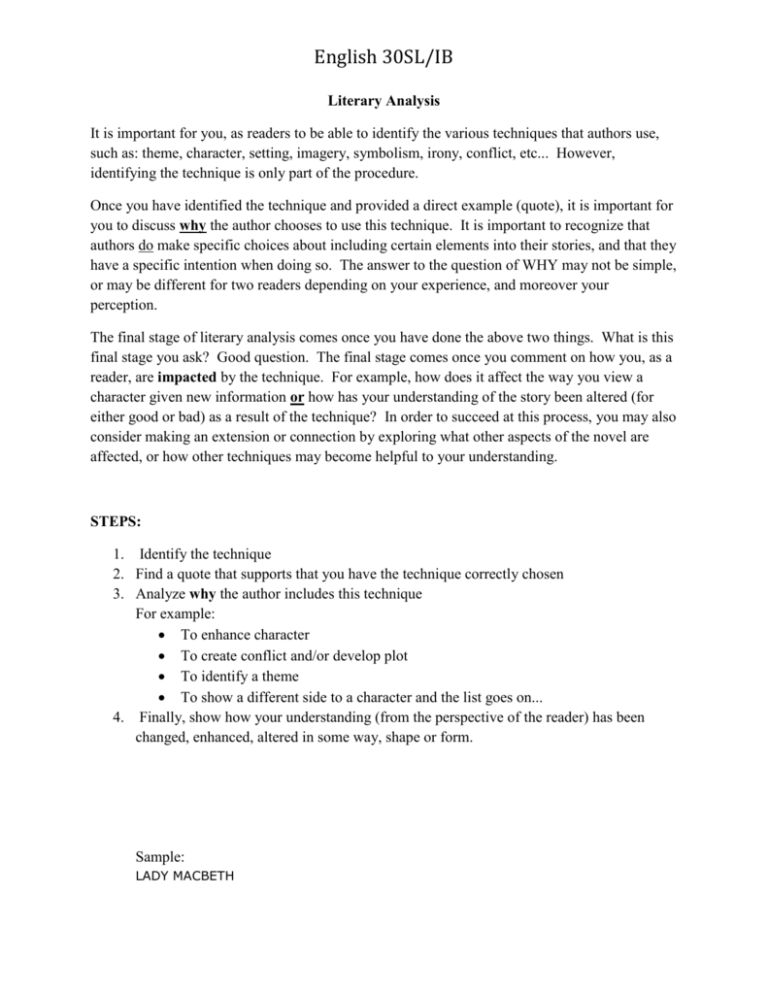
English 30SL/IB Literary Analysis It is important for you, as readers to be able to identify the various techniques that authors use, such as: theme, character, setting, imagery, symbolism, irony, conflict, etc... However, identifying the technique is only part of the procedure. Once you have identified the technique and provided a direct example (quote), it is important for you to discuss why the author chooses to use this technique. It is important to recognize that authors do make specific choices about including certain elements into their stories, and that they have a specific intention when doing so. The answer to the question of WHY may not be simple, or may be different for two readers depending on your experience, and moreover your perception. The final stage of literary analysis comes once you have done the above two things. What is this final stage you ask? Good question. The final stage comes once you comment on how you, as a reader, are impacted by the technique. For example, how does it affect the way you view a character given new information or how has your understanding of the story been altered (for either good or bad) as a result of the technique? In order to succeed at this process, you may also consider making an extension or connection by exploring what other aspects of the novel are affected, or how other techniques may become helpful to your understanding. STEPS: 1. Identify the technique 2. Find a quote that supports that you have the technique correctly chosen 3. Analyze why the author includes this technique For example: To enhance character To create conflict and/or develop plot To identify a theme To show a different side to a character and the list goes on... 4. Finally, show how your understanding (from the perspective of the reader) has been changed, enhanced, altered in some way, shape or form. Sample: LADY MACBETH English 30SL/IB Was the hope drunk Wherein you dress'd yourself? hath it slept since? And wakes it now, to look so green and pale At what it did so freely? From this time Such I account thy love. Art thou afeard To be the same in thine own act and valour As thou art in desire? Wouldst thou have that Which thou esteem'st the ornament of life, And live a coward in thine own esteem, Letting 'I dare not' wait upon 'I would,' Like the poor cat i' the adage? Q: Identify a literary technique used in the above passage and explain the effect it has the reader. A technique that Shakespeare has used in the above passage is syntax to show Lady Macbeth’s manipulative character. He begins, “Was the hope drunk Wherein you dress'd yourself? hath it slept since?” wherein Lady Macbeth is questioning her husband. He uses several questions to provide the reader with a sense for Lady Macbeth’s manipulative tactics of not outright asking Macbeth why he is so cowardly, but rather, questioning his inability to stand up and be a man. In doing so, Shakespeare emphasizes through syntax [using questioning], that readers should view Lady Macbeth in a clear light: one in which she is more manipulative, and hurtful to her husband by what she does not say, rather than what she does. As a result, the reader is left admiring Lady Macbeth’s strong nature early on in the play, and is curious to see how Macbeth will respond to her bold questioning of his manhood. Readers are appreciative of a strong willed woman who, despite her role as the lesser being compared to Macbeth [a general in an army], will stand up to her husband to achieve a stronger role in society [Macbeth becoming King]. Shakespeare’s technique also foreshadows the choices Macbeth makes later on in the play as he follows through with Lady Macbeth’s initial plan to take the throne and move into a position of power. Shakespeare’s use of foreshadowing in this same scene allows the reader to see a more negative side to her once strong character when Lady Macbeth is portrayed as “mad”, and unable to wash the “blood” from her hands [referencing guilt]. Shakespeare bends the reader’s initial thoughts toward a positive character, and now leaves readers with a negative attitude toward Lady Macbeth.



